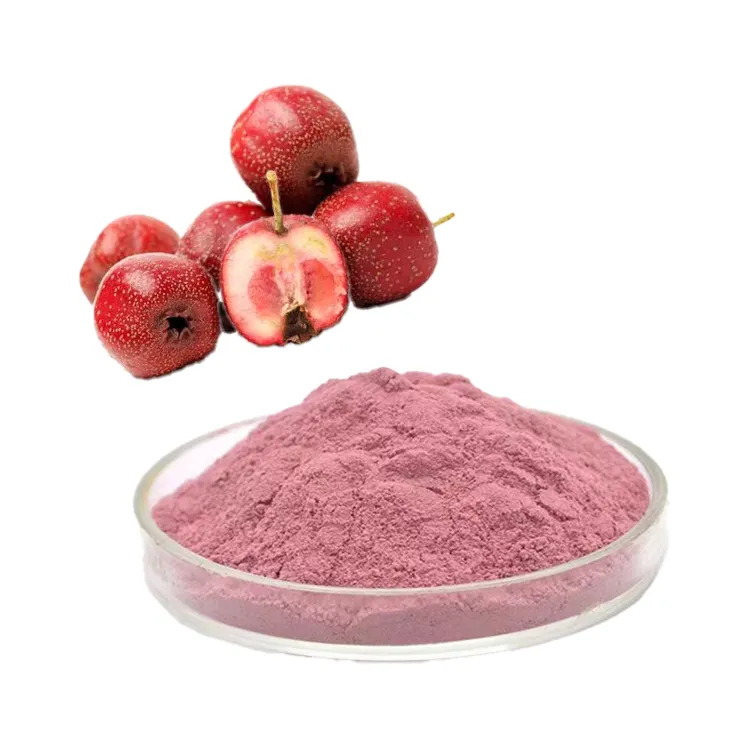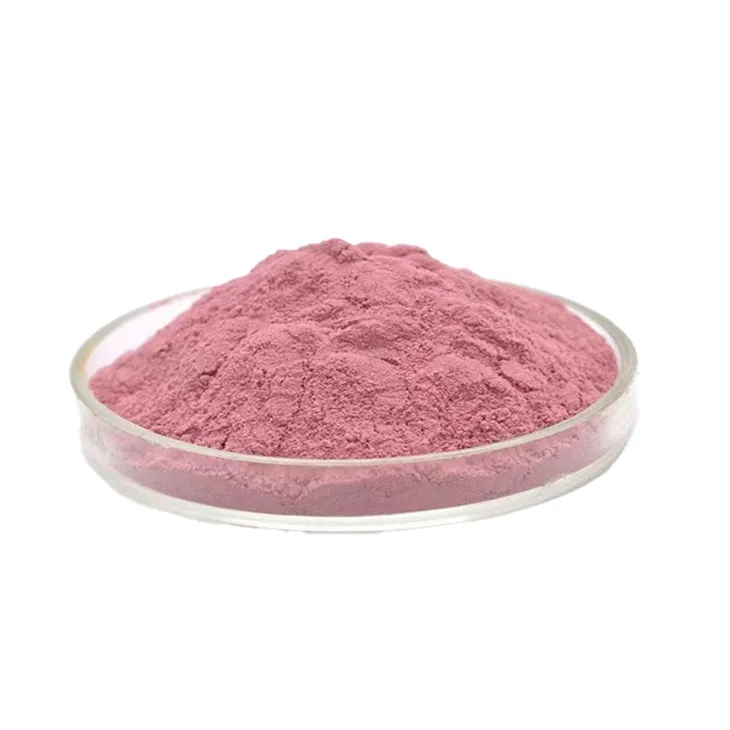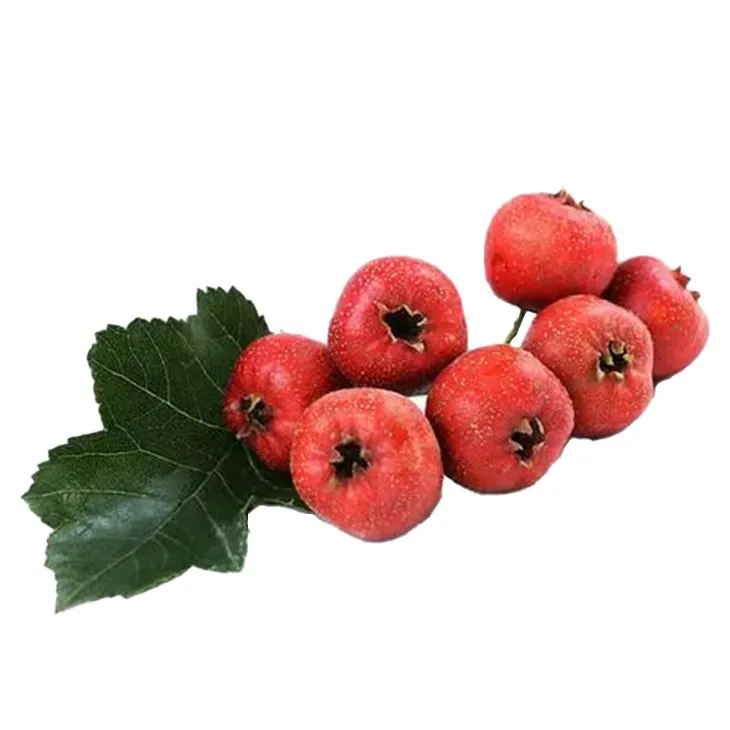- 0086-571-85302990
- sales@greenskybio.com
Hawthorn powder: Benefits, uses and possible side effects.
2024-11-12

1. Introduction
Hawthorn, a shrub or small tree native to temperate regions of the Northern Hemisphere, has been used for centuries in traditional medicine. Hawthorn powder, which is made from dried hawthorn fruits, leaves, or flowers, has gained popularity in recent years due to its potential health benefits. This article will explore the various benefits, uses, and possible side effects of Hawthorn powder.

2. Benefits of Hawthorn powder
2.1 Promoting Blood Circulation
One of the most well - known benefits of hawthorn powder is its ability to promote blood circulation. Hawthorn contains flavonoids, such as Quercetin and rutin, which have vasodilatory effects. This means that they can widen the blood vessels, allowing for better blood flow. Improved blood circulation can have a number of positive effects on the body, including reducing the risk of heart disease, improving cognitive function, and enhancing athletic performance.
2.2 Enhancing the Immune System
Hawthorn powder is also believed to enhance the immune system. It contains antioxidants, such as vitamin C and phenolic compounds, which can help to protect the body against free radicals. Free radicals are unstable molecules that can damage cells and contribute to the development of diseases, such as cancer and heart disease. By neutralizing free radicals, hawthorn powder can help to boost the immune system and keep the body healthy.
2.3 Lowering Blood Pressure
Studies have shown that hawthorn powder may have a beneficial effect on blood pressure. The vasodilatory effects of hawthorn can help to lower blood pressure by reducing the resistance in the blood vessels. This can be particularly beneficial for people with hypertension, or high blood pressure, which is a major risk factor for heart disease and stroke.
2.4 Improving Digestive Health
Hawthorn powder may also be beneficial for digestive health. It contains fiber, which can help to promote regular bowel movements and prevent constipation. Additionally, hawthorn has been used in traditional medicine to treat digestive disorders, such as indigestion, bloating, and stomach cramps.

3. Uses of Hawthorn Powder
3.1 Dietary Supplement
Hawthorn powder is often used as a dietary supplement. It can be added to smoothies, yogurt, or oatmeal for a nutritional boost. It is also available in capsule or tablet form for those who prefer a more convenient way to take it. When using hawthorn powder as a dietary supplement, it is important to follow the recommended dosage instructions.
3.2 Traditional Medicine
In traditional medicine, hawthorn has been used for a variety of ailments. It has been used to treat heart disease, high blood pressure, digestive disorders, and even anxiety. Hawthorn powder can be made into a tea or tincture for use in traditional medicine. However, it is important to note that traditional medicine uses of hawthorn should be used in conjunction with modern medical treatment, and not as a substitute for it.
3.3 Cosmetics
Hawthorn powder is also used in some cosmetics products. The antioxidants in hawthorn can help to protect the skin against free radicals, which can cause premature aging. Hawthorn powder can be found in some face creams, lotions, and serums.

4. Possible Side Effects of Hawthorn Powder
4.1 Mild Gastrointestinal Disturbances
Some people may experience mild gastrointestinal disturbances when taking hawthorn powder. These can include symptoms such as nausea, vomiting, diarrhea, or abdominal cramps. These side effects are usually mild and go away on their own. However, if they persist or are severe, it is important to stop taking the hawthorn powder and consult a healthcare provider.
4.2 Allergic Reactions
Although rare, some people may be allergic to hawthorn powder. Allergic reactions can include symptoms such as itching, hives, swelling, or difficulty breathing. If you experience any of these symptoms after taking hawthorn powder, it is important to seek medical attention immediately.
4.3 Interaction with Medications
Hawthorn powder may interact with certain medications. For example, it may interact with blood - pressure - lowering medications, heart medications, or anticoagulants. If you are taking any medications, it is important to consult your healthcare provider before taking hawthorn powder to avoid any potential interactions.

5. Conclusion
Hawthorn powder offers a number of potential benefits, including promoting blood circulation, enhancing the immune system, lowering blood pressure, and improving digestive health. It has a wide range of uses, from being a dietary supplement to being used in traditional medicine and cosmetics. However, it is important to be aware of the possible side effects, such as mild gastrointestinal disturbances, allergic reactions, and interactions with medications. As with any supplement or herbal remedy, it is always best to consult a healthcare provider before using hawthorn powder.
FAQ:
What are the main benefits of hawthorn powder?
Hawthorn powder has several benefits. It is beneficial for promoting blood circulation, which can help improve the function of the cardiovascular system. It also plays a role in enhancing the immune system, helping the body to better resist diseases.
How can hawthorn powder be used?
Hawthorn powder can be used in multiple ways. It can be used as a dietary supplement, for example, added to smoothies, yogurt, or oatmeal. In traditional medicine, it may be used in the form of herbal preparations to treat certain ailments related to blood circulation and digestion.
What are the possible side effects of hawthorn powder?
Some possible side effects of hawthorn powder may include digestive issues such as nausea, vomiting, or upset stomach in some individuals. It may also interact with certain medications, so it's important to consult a doctor before using it, especially if you are taking other drugs.
Is hawthorn powder safe for everyone?
No, hawthorn powder is not safe for everyone. People with certain medical conditions, such as low blood pressure, should be cautious as it may further lower blood pressure. Pregnant and breastfeeding women should also consult a healthcare provider before using hawthorn powder as its safety in these situations has not been fully established.
How much hawthorn powder should be consumed?
The appropriate amount of hawthorn powder to consume depends on various factors such as an individual's age, health condition, and the purpose of use. Generally, it is recommended to follow the instructions on the product label or consult a healthcare professional for personalized advice.
Related literature
- The Health Benefits of Hawthorn: A Review"
- "Hawthorn in Traditional and Modern Medicine"
- "Hawthorn: Properties, Applications, and Safety Considerations"
- ▶ Hesperidin
- ▶ citrus bioflavonoids
- ▶ plant extract
- ▶ lycopene
- ▶ Diosmin
- ▶ Grape seed extract
- ▶ Sea buckthorn Juice Powder
- ▶ Beetroot powder
- ▶ Hops Extract
- ▶ Artichoke Extract
- ▶ Reishi mushroom extract
- ▶ Astaxanthin
- ▶ Green Tea Extract
- ▶ Curcumin Extract
- ▶ Horse Chestnut Extract
- ▶ Other Problems
- ▶ Boswellia Serrata Extract
- ▶ Resveratrol Extract
- ▶ Marigold Extract
- ▶ Grape Leaf Extract
- ▶ blog3
- ▶ blog4
- ▶ blog5
-
Organic Tongkat Ali extract powder factory.
2024-11-12
-
How to make powder with ashwagandha extract.
2024-11-12
-
Rosehip extract manufacturers from China.
2024-11-12
-
The best cat's claw extract in nature.
2024-11-12
-
Chinese Dandelion Leaf Extract Suppliers.
2024-11-12
-
Ivy Extract
2024-11-12
-
Black Pepper Extract
2024-11-12
-
Epimedium extract powder
2024-11-12
-
Cat Claw Extract
2024-11-12
-
Licorice Root Extract Powder
2024-11-12
-
Sophora Japonica Flower Extract
2024-11-12
-
Artichoke Leaf Extract
2024-11-12
-
Saffron Extract Powder
2024-11-12
-
Curcuma Longa Extract/Turmeric extract
2024-11-12
-
Cactus Extract
2024-11-12





















